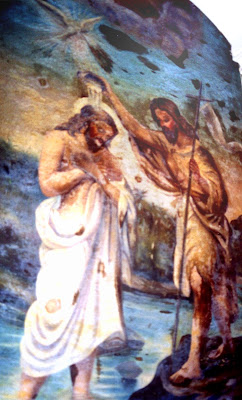Critique these photographs, before and after editing.
Living with Nature School on Blog
Paaralang Bayan sa Himpapawid (People's School-on-Air) with Ms Melly C Tenorio
738 DZRB AM Band, 8 to 9 evening class, Monday to Friday

 Delegates to the Asian Conference of Religions for Peace 2008,
Delegates to the Asian Conference of Religions for Peace 2008,at UST. Edited version and original photo (below). Note increase
in size of frame, brightness, contrast, and cropped area.
Baptism of Christ, an old painting found in the cathedral Ho Chi
Mingh City. Edited to correct distortion and improve perspective.
The dove and angel on top were inadvertently cropped out. Such
details should be preserved, if not enhanced, in photo editing.
Each version exudes an aura that touches emotion, revives memories or simply stirs imagination about war, although the message may only be secondary to the artistic interpretation of the viewer. The versions are poetic in different ways, and may be closely identified with romanticism, rather than realism or abstractionism. Today's photography offers techniques to explore the virtually limitless potentials of photography as an art and apply them with the other disciplines of knowledge and fields of human endeavor.

.jpg)


NOTE: Photo editing uses many tools, but it has limitations, too. There are basic defects which can only be corrected by sacrificing originality and authenticity, and when done to the extreme, a photograph leads to what artists call "computer art."
Indeed, the versatility of the computer can result to unimaginable versions of editing leading to abstract and composite images - which may no longer belong to the realm of photography. Thus, belying the adage, "You and I may lie, but the camera does not lie." ~



No comments:
Post a Comment